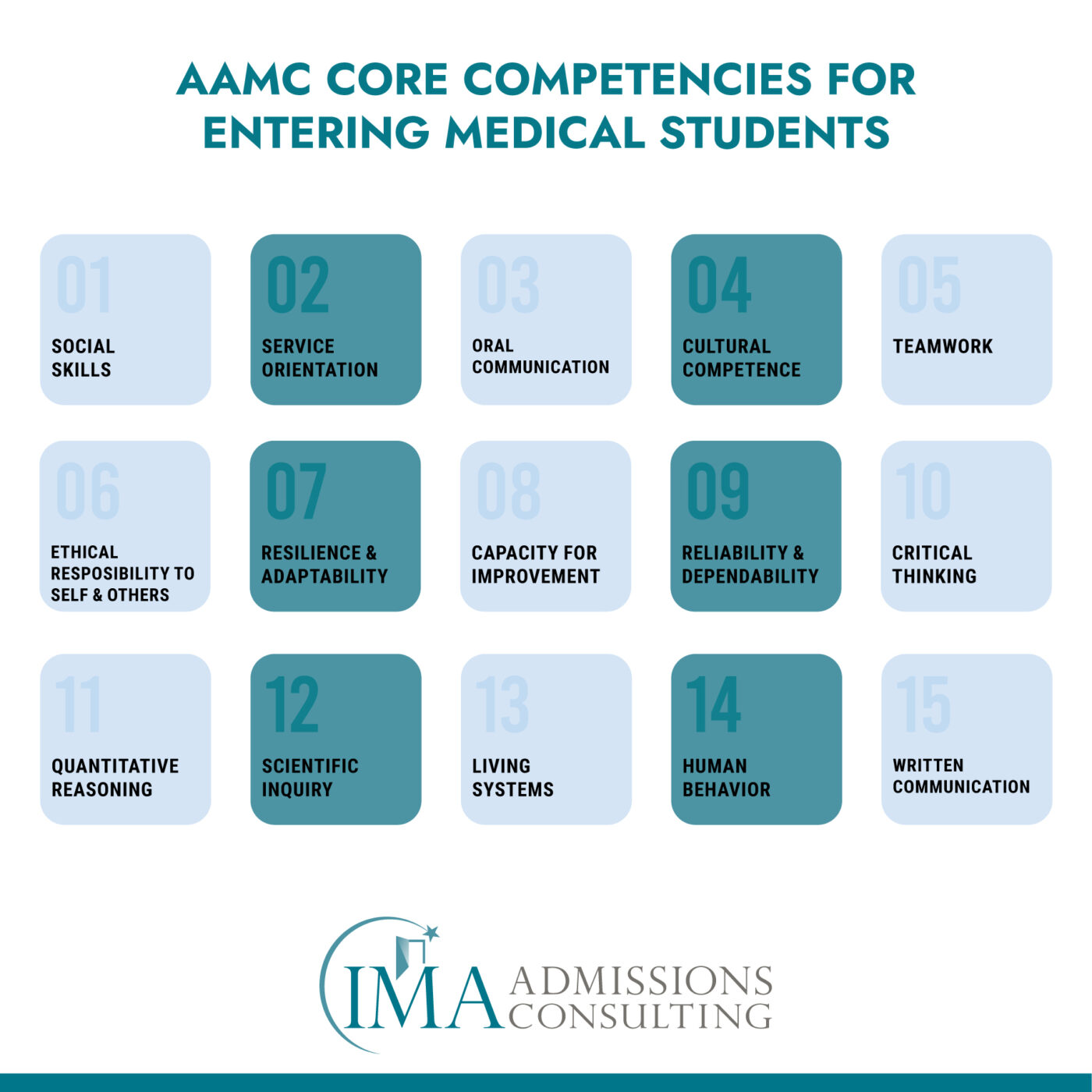Out of thousands and thousands of candidates, the average medical enrolls less than 200 students each year. Admissions committees conduct holistic reviews to determine who is well-rounded and disciplined in the many skills necessary to become a successful physician.
As a pre-med student, it’s essential to understand the AAMC Core Competencies before applying to medical school. While different programs may require and emphasize different strengths, all medical schools look to the AAMC Core Competencies to guide their decision on who to enroll.
This article breaks down each of the 15 AAMC Core Competencies. We list examples of how to demonstrate these competencies, as well as tips for how to stand out among other applicants.
First, here’s the complete list of the AAMC Core Competencies. They fall under four main categories: Interpersonal, Intrapersonal, Thinking and Reasoning, and Science.
Interpersonal Competencies
- Service Orientation
- Social Skills
- Cultural Competence
- Teamwork
- Oral Communication
Intrapersonal Competencies
- Ethical Responsibility to Self and Others
- Reliability and Dependability
- Resilience and Adaptability
- Capacity for Improvement
Thinking and Reasoning Competencies
- Critical Thinking
- Quantitative Reasoning
- Scientific Inquiry
- Written Communication
Science Competencies
- Living Systems
- Human Behavior
Now, let’s take a close-up look at each of the AAMC Core Competencies by covering the AAMC definitions and discussing what they mean in practice.

AAMC Core Competencies: Interpersonal Competencies
Interpersonal competence is your ability to communicate with others and maintain healthy relationships. This involves interacting with others in a way that builds mutual respect, trust, and cooperation. Let’s discuss the five core competencies in this category.
Service Orientation
AAMC definition: “Demonstrates a desire to help others and sensitivity to others’ needs and feelings; demonstrates a desire to alleviate others’ distress; recognizes and acts on his/her responsibilities to society; locally, nationally, and globally.”
In short, service orientation is about seeing the needs of others and being moved to help. It’s also about having a greater sense of social responsibility.
Service orientation is usually demonstrated through volunteer work. However, volunteering alone doesn’t necessarily demonstrate the qualities listed by the AAMC.
Service orientation is, quite literally, being oriented to serve. Volunteer activities and application essays about service should demonstrate being moved by empathy to help others — it’s not just about volunteering a lot. You should pursue a cause you are passionate about, continue to learn about the issue, and be able to articulate how your work is making a difference you are truly proud of.
You don’t have to limit yourself to healthcare-related activities. However, programs such as IMA’s Pre-Med Internships Abroad provide an opportunity to serve those who are medically underserved while gaining first-hand experience in the field.
Social Skills
AAMC definition: “Demonstrates an awareness of others’ needs, goals, feelings, and the ways that social and behavioral cues affect peoples’ interactions and behaviors; adjusts behaviors appropriately in response to these cues; treats others with respect.”
Having good social skills means being aware of other people’s feelings and how your behavior affects people. It also means being able to adjust your behavior when necessary and communicate respect.
Social skills are important in medicine because you will be interacting with patients, their families, and other healthcare providers daily. Good social skills are necessary to build trust, understand patients’ needs, and work efficiently with others.
Having good social skills doesn’t mean being a “social” person, per se. It simply means being able to interact with others in a way that is aware, respectful, and caring.
Your social skills will be most closely evaluated during the interview portion of your application process. However, there are plenty of activities that can demonstrate social skills on paper. Joining clubs, presenting projects, and working jobs such as retail or service industry positions can all show off your social skills.
Exceptional ways to demonstrate social skills include activities that require extraordinary charisma and empathic ability. Examples might include being a leader in a club or workplace, starting your own organization, or working with people with disabilities.
Cultural Competence
AAMC definition: “Demonstrates knowledge of socio-cultural factors that affect interactions and behaviors; shows an appreciation and respect for multiple dimensions of diversity; recognizes and acts on the obligation to inform one’s own judgment; engages diverse and competing perspectives as a resource for learning, citizenship, and work; recognizes and appropriately addresses bias in themselves and others; interacts effectively with people from diverse backgrounds.”
Cultural competency is about more than respecting people who are different than you, though that is certainly a part of it. Cultural competence means understanding how socio-cultural factors play a part in interactions and judgments. By being informed of the unique prejudices faced by different communities, you can respect, appreciate, and listen to people from those communities more deeply.
Cultural competency is important in medicine because without it certain people are at risk of being underserved or even harmed by the medical system. For example, if a doctor is not culturally competent, they may not be able to effectively communicate with a patient from a different cultural background.
Overcoming bias is also an important part of cultural competence. To overcome bias, you have to first be aware of bias. That’s why doctors must obligate themselves to learn about how socio-cultural bias works and how to spot it.
There are many ways to demonstrate cultural competence in your application. Examples include taking courses related to social justice or diversity, participating in cultural clubs or organizations, and conducting research with a focus on socio-cultural factors.
Nearly every medical school application includes an essay question about cultural competency. Citing research or other literature you’ve read on the topic, sharing a personal story about overcoming bias, or detailing your experience with and commitment to understanding other cultures are all excellent ways to answer this question.
The best way to demonstrate cultural competence is through your personal experiences with other cultures. Programs such as IMA’s Pre-Med Study Abroad Internships are a great way to get deep, first-hand experience with other cultures while also showing your dedication to medicine
Teamwork
AAMC definition: “Works collaboratively with others to achieve shared goals; shares information and knowledge with others and provides feedback; puts team goals ahead of individual goals.”
Teamwork is essential in medicine. Doctors have to work with other healthcare providers, such as nurses, social workers, and pharmacists. They also have to work with patients and their families.
Working well on a team requires good communication, compromise, and the ability to see different perspectives. It also requires putting the team’s goals ahead of your own.
In the AAMC Core Competencies, the definition of teamwork hones in on an often overlooked aspect: sharing knowledge and providing feedback. The impulse to teach others and help them grow is one of the defining characteristics of an important teammate. Wanting to learn from others is just as valuable.
There are many ways to demonstrate teamwork in your application. Examples include participating in sports, working on group projects, and being a leader in a club or organization.
Exceptional demonstrations of teamwork include completing large-scale and/or complicated tasks or working with a diverse group of people.
Oral Communication
AAMC definition: “Effectively conveys information to others using spoken words and sentences; listens effectively; recognizes potential communication barriers and adjusts approach or clarifies information as needed.”
Simply put, oral communication is about being able to talk and listen to others effectively.
Oral communication is important in medicine because doctors have to communicate with patients and their families all the time. They have to explain complex medical concepts in simple terms, give instructions, and provide emotional support.
Part of being competent in oral communication includes being able to tell when communication barriers arise, such as noticing when someone doesn’t understand you or when there’s a cultural difference in communication styles. Being able to adjust your wording and clarify what you’re trying to say in these situations is an important skill.
Activities such as participating in debate and discussion groups, public speaking, and customer service jobs can demonstrate competency in oral communication skills.
Exceptional demonstrations of oral communication include communicating complex ideas, communicating under pressure, or working with children, the elderly, or people with disabilities.
Medical School Admissions Consulting is a powerful tool for medical school applicants.
Our website is packed with useful information for medical school applicants and future physicians. Still, the most effective way to navigate the application process is with professional, personalized guidance. We help with everything from in-depth application reviews to conducting mock medical school interviews. Hundreds of students are studying in top medical schools thanks to our help, and we promise you won’t be an exception to our excellent track record.
Interested in a complimentary 30-minute consultation session? Find out more about Medical School Admissions Consulting here.
AAMC Core Competencies: Intrapersonal Competencies
Intrapersonal competency is about your ability to self-reflect. It’s about having a good understanding of your own thoughts, emotions, and behaviors. Let’s take a look at the four competencies in this category.
Ethical Responsibility to Self and Others
AAMC definition: “Behaves in an honest and ethical manner; cultivates personal and academic integrity; adheres to ethical principles and follows rules and procedures; resists peer pressure to engage in unethical behavior and encourages others to behave in honest and ethical ways; develops and demonstrates ethical and moral reasoning.”
Being ethically responsible means putting ethical principles above all else. This includes behaving honestly and with integrity, following institutional rules, encouraging ethical behavior in others, and pursuing a greater understanding of ethical reasoning.
Of all the professions, medicine might be the one where ethical responsibility is most important. After all, doctors have a duty to do no harm. They also have access to sensitive information about patients and their families. They have to be able to resist pressure to engage in unethical behavior, such as sharing confidential information or taking shortcuts. Finally, many of the codes that guide doctoring are established to ensure that patients receive the best possible care, and failing to abide could mean harming patients.
Ethical responsibility can be demonstrated by taking courses in ethics, working somewhere that requires ethical reasoning, or recruiting others into an ethical project, cause, or organization.
Exceptional demonstrations of ethical responsibility include showcasing ethical reasoning through navigating a complex moral issue, being a leader in an ethical cause, or developing an ethical code for an organization.
Reliability and Dependability
AAMC definition: “Consistently fulfills obligations in a timely and satisfactory manner; takes responsibility for personal actions and performance.”
Reliability and dependability mean being able to be counted on. Medicine is a profession with high stakes and often life-or-death consequences. Patients need to be able to rely on their doctors to be competent and dependable, and healthcare workers need to know they can count on each other.
Additionally, having a sense of responsibility for personal performance is a key characteristic of a reliable person. People who make a habit of avoiding accountability and deferring responsibility are less likely to come through in a challenging situation.
There are many ways to demonstrate reliability and dependability. Examples include having a steady job, being involved in long-term projects, and taking on leadership roles.
Letters of recommendation from teaching faculty you’ve worked with are also a great way to show you’re reliable.
Exceptional demonstrations of reliability and dependability include time-sensitive, collaborative work, tasks that involve careful planning, or completing tasks despite an unexpected workload.
Resilience and Adaptability
AAMC definition: “Demonstrates tolerance of stressful or changing environments or situations and adapts effectively to them; is persistent, even under difficult situations; recovers from setbacks.”
Being able to adapt to change and cope with the stress is essential for success in medical school and beyond. The workload of a physician is demanding, and the environment can be emotionally challenging. Doctors need to be able to persevere through long hours, unexpected developments, and difficult situations.
Some ways to practice resilience and adaptability include taking on new challenges, working in a fast-paced environment, and dealing with difficult people.
Exceptional demonstrations of resilience and adaptability include situations with sudden, unexpected changes, completing long-term, stressful tasks, or balancing multiple challenges at once.
Capacity for Improvement
AAMC definition: “Sets goals for continuous improvement and for learning new concepts and skills; engages in reflective practice for improvement; solicits and responds appropriately to feedback.”
Capacity for improvement is about your ability to learn and grow. The AAMC describes it as a desire to improve. This includes setting goals, engaging in self-reflection, and taking full advantage of feedback.
As a medical student, you’ll be expected to learn new concepts and skills quickly. As a doctor, you’ll need to be a lifelong learner to keep up with a constantly evolving medical field. As both, your ability to motivate yourself to always be improving is essential to success.
Areas that demonstrate a capacity for improvement can include academics, employment, healthcare internships, research, and extracurricular activities. Some examples include retaking courses, correcting/improving research papers, or continuing to study academic topics after completing a course.
Exceptional demonstrations of a capacity for improvement include actively seeking and integrating feedback, making significant changes because of new information, self-directed study, or setting and accomplishing hard-to-achieve goals.
AAMC Core Competencies: Thinking and Reasoning Competencies
Thinking and reasoning competencies are about your ability to analyze information and solve problems. This category has four competencies — let’s take a look.
Critical Thinking
AAMC definition: “Uses logic and reasoning to identify the strengths and weaknesses of alternative solutions, conclusions, or approaches to problems.”
Critical thinking is your ability to reason through a situation by understanding its possibilities and make sound judgments based on those possibilities. Critical thinking is used to prioritize, come up with backup plans, understand how things relate, understand sequences of cause and effect, and think through different overall strategies.
You can demonstrate critical thinking in many academic and professional situations, including coursework, research, work experience, and extracurricular activities. Some examples of critical thinking include identifying biases, evaluating arguments, and developing effective strategies.
Exceptional demonstrations of critical thinking include solving complex problems, considering multiple perspectives, and developing new solutions to problems.
Quantitative Reasoning
AAMC definition: “Applies quantitative reasoning and appropriate mathematics to describe or explain phenomena in the natural world.”
Quantitative reasoning is being able to use math and numbers to explain or understand a situation. This is different from critical thinking in that quantitative reasoning uses data and numbers as its foundation, while critical thinking uses logic and reasoning.
Mathematics studies the abstract rules and relationships of numbers, formulas, and geometry. Quantitative reasoning is the ability to apply these concepts to analyze or explain real-world situations. Physicians and clinical scientists use quantitative reasoning to determine the amount of medicine to give a patient, understand medical histories, analyze diagnostic material, predict disease patterns, and more.
Research, mathematics coursework, coding, and data analysis are all examples of activities that display quantitative reasoning skills.
Exceptional demonstrations of quantitative reasoning include using complex mathematics to solve real-world problems, developing new mathematical understandings of situations, optimizing applied mathematical procedures, and analyzing large data sets.
Scientific Inquiry
AAMC definition: “Applies knowledge of the scientific process to integrate and synthesize information, solve problems and formulate research questions and hypotheses; is facile in the language of the sciences and uses it to participate in the discourse of science and explain how scientific knowledge is discovered and validated.”
In the AAMC Core Competencies, scientific inquiry includes using the scientific method to produce solutions and questions, being fluent in scientific language, participating in scientific discourse, and understanding the methods of science.
The scientific method is a process that scientists use to understand the natural world. It includes making observations, asking questions, forming hypotheses, conducting experiments, and analyzing data. Scientists use the scientific method to solve problems and advance their knowledge of the world.
Being fluent in scientific language means being able to read, write, and speak the language of science. This includes understanding scientific terms, being able to read and understand scientific papers, and being able to communicate effectively with other scientists.
Participating in scientific discourse means being involved in the conversation about science. This can include presenting research at conferences, writing papers for publication, participating in online forums and chatrooms, and discussing science with friends and family.
Understanding the methods of science means understanding how scientists conduct research and how they arrive at their conclusions. This includes understanding the design of experiments, the analysis of data, and the interpretation of results.
Science coursework, research, and academic writing are all examples of activities that display scientific inquiry skills.
Exceptional demonstrations of scientific inquiry include conducting original research, publishing papers in scientific journals, presenting research at conferences, and teaching others about science.
Written Communication
AAMC definition: “Effectively conveys information to others using written words and sentences.”
While some of the AAMC Core Competencies require a bit of explanation, the written communication competency is fairly straightforward: it means being able to communicate well in writing. This includes writing clear and concise sentences, using proper grammar and punctuation, and being able to communicate complex ideas in writing.
Writing is an important skill for physicians and clinical scientists because they are constantly communicating medical concepts, histories, needs, and questions through writing. Additionally, contributing to medical research requires accurate and clear writing to communicate findings to other clinical scientists.
Writing-intensive coursework, essay writing, and work that requires regular written communication are all examples of activities that display competency in written communication.
Exceptional demonstrations of written communication include writing papers for publication in academic journals, writing grants to fund research projects, and teaching others about complex concepts through writing.
However, your writing skills will be judged first by the quality of your secondary application essay responses. If you’re looking for help crafting clear and effective essays, we can help.
AAMC Core Competencies: Science Competencies
The final category of the AAMC Core Competencies covers specific areas of science that are important for medical students and physicians to be proficient in. Let’s take a look at these two categories.
Living Systems
AAMC definition: “Applies knowledge and skill in the natural sciences to solve problems related to molecular and macro systems including biomolecules, molecules, cells, and organs.”
The first science competency, living systems, covers the basic concepts of biology that are important for medical students to understand. This includes cell structure and function, genetics, and physiology.
Additionally, medical students need to be able to apply this knowledge to real-world problems. This might include being able to diagnose a patient based on their symptoms, understanding how a disease progresses, or developing new treatments for diseases.
Biology coursework, research in the biological sciences, and attending conferences related to living systems are all examples of activities that display competency in living systems.
Exceptional demonstrations of competency in living systems include conducting or publishing complex biological research, taking graduate-level courses about biology, teaching biological sciences, or enrolling in didactic healthcare internships.
Human Behavior
AAMC definition: “Applies knowledge of the self, others, and social systems to solve problems related to the psychological, socio-cultural, and biological factors that influence health and well-being.”
Understanding the science of human behavior means being able to understand how humans think, feel, and behave individually and as part of a group. Additionally, medical candidates should have experience applying behavioral science to medical problems.
This might include understanding how psychological factors can influence a patient’s health, using social science to develop public health policy, or studying the relationship between biology and human behavior.
Courses in psychology, sociology, anthropology, and public health are all examples of activities that display competency in human behavior.
Exceptional demonstrations of competency in human behavior include conducting or publishing research about human behavior, volunteering at mental health clinics, or taking graduate-level courses related to human behavior.
Developing Core Competencies with International Medical Aid
While understanding the AAMC Core Competencies is essential for crafting a strong medical school application, the next challenge is demonstrating them effectively. Admissions committees aren’t just looking for students who can list experiences—they want applicants who have engaged meaningfully in activities that cultivate and reflect these competencies.
For many students, International Medical Aid (IMA) provides a structured pathway to develop these essential skills. Through hands-on medical internships, global health research opportunities, and comprehensive medical school admissions consulting, IMA helps applicants build a competitive application while making a real impact in underserved communities.
Turning Core Competencies into Strong Application Experiences
Tangible experiences must back each of the AAMC Core Competencies. Simply stating that you possess a skill isn’t enough—you need to showcase how you’ve developed and applied it. This is where IMA’s pre-medical internships and medical school admissions consulting can be instrumental.
For example, consider these ways IMA programs help applicants strengthen key competencies:
- Service Orientation → Medical internships in underserved communities provide direct patient care exposure, demonstrating a genuine commitment to serving others.
- Cultural Competence → Working in international healthcare settings deepens your understanding of how socio-cultural factors influence patient care.
- Teamwork → Collaborating with local physicians, healthcare workers, and fellow interns hones your ability to function effectively in a multidisciplinary medical team.
- Resilience and Adaptability → Facing real-world medical challenges in resource-limited settings demonstrates your ability to adapt under pressure and maintain composure in dynamic environments.
- Scientific Inquiry → Opportunities for global health research with IMA allow students to engage in meaningful projects that contribute to public health knowledge.
Strengthening Your Personal Statement and Interviews
Beyond gaining experience, it’s crucial to effectively communicate how these experiences have shaped you as a medical school applicant. Many students struggle with translating their research, clinical, and volunteer work into compelling application materials. IMA’s medical school admissions consulting team works with applicants to ensure their personal statements, secondary essays, and interviews highlight their competencies in a clear, engaging, and strategic manner.
When describing experiences, it’s important to go beyond what you did and emphasize:
- Why you chose the experience (your motivations).
- What you learned (personal growth and insights).
- How it shaped your future as a physician (connections to medical school and career goals).
For example, an applicant who completed an IMA internship might write:
“During my pre-med internship in Kenya, I witnessed firsthand the barriers patients face in accessing care. I worked alongside local physicians, assisting with patient intake and triaging cases in a community clinic. Seeing the stark contrast in healthcare resources strengthened my resolve to advocate for equitable medical access and deepened my understanding of social determinants of health. This experience reinforced my commitment to service-oriented medicine and my desire to work with underserved populations as a future physician.”
This type of narrative-driven storytelling allows admissions committees to see how an applicant’s experiences align with the AAMC Core Competencies authentically.
Leveraging IMA’s Admissions Consulting for a Competitive Edge
Medical school admissions are increasingly competitive, and a strong application goes beyond just good grades and test scores. A well-rounded, competency-driven application is what sets top candidates apart.
IMA’s consulting services offer:
- One-on-one application guidance tailored to your strengths.
- Personal statement and secondary essay reviews to ensure compelling storytelling.
- Mock interviews to refine responses and highlight core competencies.
- Comprehensive application strategy planning to strengthen your chances of acceptance.
Many students who struggle with demonstrating their competencies on paper benefit from professional guidance in writing medical school applications that showcase their true potential.
Preparing for Success in Medical School Admissions
Developing the AAMC Core Competencies is essential for every medical school applicant, but effectively demonstrating them requires strategic experience and strong application writing. Through medical internships, research opportunities, and expert medical school admissions guidance, International Medical Aid equips students with the skills and experiences needed to stand out.
If you want to enhance your application with impactful global health experiences and expert consulting, contact one of our advisors today to learn more about how IMA can help you gain meaningful pre-med experience and get accepted to medical school.
How to Personally Improve in the AAMC Core Competencies
The AAMC Core Competencies certainly span a wide range of skills. Focusing on fulfilling each competency separately is not necessarily the most effective path.
The uniting theme in the AAMC Core Competencies is that they are all tested in medical school and healthcare-related work. This means that experiencing the healthcare profession firsthand will fulfill most, if not all, of the AAMC Core Competencies.
Our pre-med internships are didactic, intensive, hands-on and serve some of the world’s most vulnerable populations. The breadth and quality of our internships abroad amply prepare future physicians for the rigors of medical school. They also include personalized consulting to help you develop overall application strategies, so you can get into the medical school that best fits your unique ambitions.
We wish you luck in your journey to becoming a physician!







